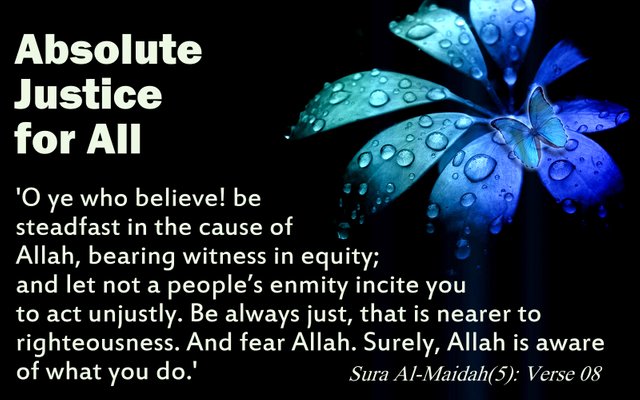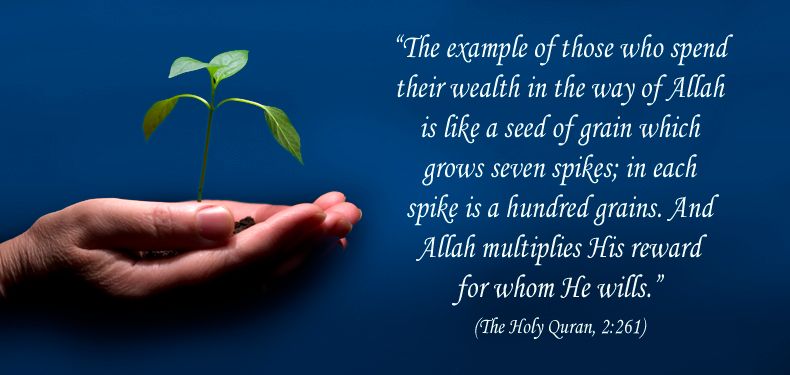
The Meaning of Justice
In the Islamic worldview, justice denotes placing things in their rightful place. It also means giving others equal treatment. In Islam, justice is also a moral virtue and an attribute of human personality, as it is in the Western tradition. Justice is close to equality in the sense that it creates a state of equilibrium in the distribution of rights and duties, but they are not identical. Sometimes, justice is achieved through inequality, like in unequal distribution of wealth. The Prophet (peace and blessings of Allah be upon him) of Islam declared:
“There are seven categories of people whom God will shelter under the shade of His throne on the Day when there will be no shade except this. [One is] the just leader.”(Saheeh Muslim)
God spoke to His Messenger (peace and blessings of Allah be upon him) in this manner:
“O My slaves, I have forbidden injustice for Myself and forbade it also for you. So avoid being unjust to one another.” (Saheeh Muslim)
Thus, justice represents moral rectitude and fairness, since it means things should be where they belong.
The Importance of Justice
The Quran, the sacred scripture of Islam, considers justice to be a supreme virtue. It is a basic objective of Islam to the degree that it stands next in order of priority to belief in God’s exclusive right to worship (Tawheed) and the truth of Muhammad’s (peace and blessings of Allah be upon him) prophethood. God declares in the Quran:
“God commands justice and fair dealing...” (Quran 16:90)
And in another passage:
“O you who believe, be upright for God, and (be) bearers of witness with justice!...” (Quran 5:8)
Therefore, one may conclude that justice is an obligation of Islam and injustice is forbidden. The centrality of justice to the Quranic value system is displayed by the following verse:
“We sent Our Messengers with clear signs and sent down with them the Book and the Measure in order to establish justice among the people…” (Quran 57:25)
The phrase ‘Our Messengers’ shows that justice has been the goal of all revelation and scriptures sent to humanity. The verse also shows that justice must be measured and implemented by the standards and guidelines set by revelation. Islam’s approach to justice is comprehensive and all-embracing. Any path that leads to justice is deemed to be in harmony with Islamic Law. All means, procedures, and methods that facilitate, refine, and advance the cause of justice, and do not violate the Islamic Law are valid.
Equality in Justice
The Quranic standards of justice transcend considerations of race, religion, color, and creed, as Muslims are commanded to be just to their friends and foes alike, and to be just at all levels, as the Quran puts it:
“O you who believe! Stand out firmly for justice, as witnesses to Allah, even if it be against yourselves, your parents, and your relatives, or whether it is against the rich or the poor...” (Quran 4:135)
According to another Quranic passage:
“Let not the hatred of a people swerve you away from justice. Be just, for this is closest to righteousness…” (Quran 5:8)
With regards to relations with non-Muslims, the Quran further states:
“God does not forbid you from doing good and being just to those who have neither fought you over your faith nor evicted you from your homes...” (Quran 60:8)

The scholars of the Quran have concluded that these rulings apply to all nations, followers of all faiths, as a matter of fact to all humanity. In the view of the Quran, justice is an obligation. That is why the Prophet (peace and blessings of Allah be upon him) was told:
“…If you judge, judge between them with justice…” (Quran 5:42)
“We have revealed to you the scripture with the truth that you may judge between people by what God has taught you.” (Quran 4:105)
Furthermore, the Prophet (peace and blessings of Allah be upon him) was sent as a judge between peoples, and told:
“…Say: I believe in the Scripture, which God has sent down, and I am commanded to judge justly between you...” (Quran 42:15)
The Quran views itself as a scripture devoted mainly to laying down the principles of faith and justice. The Quran demands that justice be met for all, and that it is an inherent right of all human beings under Islamic Law. The timeless commitment of the Quran to the basic standards of justice is found in its declaration:
“And the Word of your Lord has been fulfilled in truth and in justice. None can change His Words.” (Quran 6:115)
To render justice is a trust that God has conferred on the human being and, like all other trusts, its fulfillment must be guided by a sense of responsibility beyond mere conformity to set rules. Thus, the Quran states:
“God commands you to render trusts to whom they are due, and when you judge between people, judge with justice…” (Quran 4:58)
The reference to justice which immediately follows a reference to fulfillment of trusts indicates that it is one of the most important of all trusts.
Justice and the Self
The Quranic concept of justice also extends justice to being a personal virtue, and one of the standards of moral excellence that a believer is encouraged to attain as part of his God-consciousness. God says:
“…Be just, for it is closest to God-consciousness…” (Quran 5:8)
The Prophet himself instructed:
“Be conscious of God and be just to your children.”[ Riyad us-Saliheen]
The Quran tells the believers:
“…When you speak, speak with justice, even if it is against someone close to you…” (Quran 6:152

Hi! I am a robot. I just upvoted you! I found similar content that readers might be interested in:
http://www.islamreligion.com/articles/376/justice-in-islam
Downvoting a post can decrease pending rewards and make it less visible. Common reasons:
Submit
good ... SMF
Downvoting a post can decrease pending rewards and make it less visible. Common reasons:
Submit
Congratulations @sadkiller! You have completed some achievement on Steemit and have been rewarded with new badge(s) :
Click on any badge to view your own Board of Honor on SteemitBoard.
For more information about SteemitBoard, click here
If you no longer want to receive notifications, reply to this comment with the word
STOPDownvoting a post can decrease pending rewards and make it less visible. Common reasons:
Submit
Congratulations @sadkiller! You received a personal award!
Click here to view your Board of Honor
Do not miss the last post from @steemitboard:
Downvoting a post can decrease pending rewards and make it less visible. Common reasons:
Submit
Congratulations @sadkiller! You received a personal award!
You can view your badges on your Steem Board and compare to others on the Steem Ranking
Vote for @Steemitboard as a witness to get one more award and increased upvotes!
Downvoting a post can decrease pending rewards and make it less visible. Common reasons:
Submit